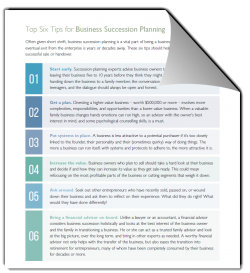For business owners, succession planning should be a vital part of their strategy – even if the eventual exit from the enterprise is years or decades away.
However, a recent poll found that only 42 per cent of small business owners are uncertain about their retirement and almost half – 48 per cent don’t seek financial advice.
Use these six tips to evaluate if you’re paving a road for success or if you need to clear some bumps along the way.
Often given short shrift, business succession planning is a vital part of being a business owner – even if the eventual exit from the enterprise is years or decades away. These six tips should help pave the way for a successful sale or handover.
- Start early. Succession-planning experts advise business owners to start drawing up plans for leaving their business five to 10 years before they think they might do so. If they’re considering handing down the business to a family member, the conversation should start when the kids are teenagers, and the dialogue should always be open and honest.
- Get a plan. Divesting a higher-value business – worth $500,000 or more – involves more complexities, responsibilities, and opportunities than a lower-value business. When a valuable family business changes hands emotions can run high, so an advisor with the owner’s best interest in mind, and some psychological counselling skills, is a must.
- Put systems in place. A business is less attractive to a potential purchaser if it’s too closely linked to the founder, their personality and their (sometimes quirky) way of doing things. The more a business can run itself, with systems and protocols to adhere to, the more attractive it is.
- Increase the value. Business owners who plan to sell should take a hard look at their business and decide if and how they can increase its value as they get sale-ready. This could mean refocusing on the most profitable parts of the business or cutting segments that weigh it down.
- Ask around. Seek out other entrepreneurs who have recently sold, passed on, or wound down their business and ask them to reflect on their experience. What did they do right? What would they have done differently?
- Bring a financial advisor on board. Unlike a lawyer or an accountant, a financial advisor considers business succession holistically and looks at the best interest of the business owner and the family in transitioning a business. He or she can act as a trusted family advisor and look at the big picture, over the long term, and bring in other experts as needed. A worthy financial advisor not only helps with the transfer of the business, but also eases the transition into retirement for entrepreneurs, many of whom have been completely consumed by their business for decades or more.
P.S. Download our complete Business Succession Planning 101 E-book to understand what you should you know before you sell or wind down your business.
Rely on a Professional
A financial advisor should be part of any business owner’s team of experts from day one, as an experienced expert who has broad and deep knowledge, and access to professional counter-parts across a range of other wealth management and planning disciplines. But they play an especially important role when an entrepreneur decides to consider selling, passing down or closing out his or her business. In fact, they’re a team member that no business can afford to be without.
Speak to your advisor or contact one of our advisors to see how we can help.


Comments are closed here.